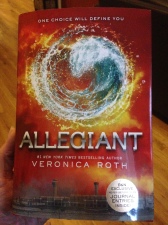You may remember that my last Friday Reads post was a recap of DIVERGENT and INSURGENT—and that I was super excited to read the final book in the trilogy, ALLEGIANT! Well... I finished it. And it was good! But I have thoughts. And feelings. And I want to share them with you! But I also don't want to spoil anything for those who haven't finished the book, so here's what I'm going to do: After the picture of the book, the spoiler area begins. On the main page, I'll hide the spoilers below a break, so you don't accidentally scroll past a spoiler. So don't scroll down! This is your warning! Also, please comment with your thoughts! And know that the comments are a spoiler area, too, so don't read them if you don't want to know how ALLEGIANT ends!
Enough due diligence? I hope so. Don't say I didn't warn you.
Still with me? Seriously, if you haven't read the book yet, and you think you might want to, stop reading now!!
*
*
*
*
So let's talk about ALLEGIANT. Overall, I thought it was a successful conclusion to the series, and the thing that happens at the end...
Okay, who am I kidding, analyzing this like it's just a normal plot development? Tris, the protagonist, DIES AT THE END. It's not that I wasn't expecting someone to "pay the ultimate price," especially when Tris and Four were so happy and in love 100 pages from the end and said they'd see each other soon. I just expected it to be Four that died, rather than the other way around. And yet, the more I thought about it, the more it made sense for Tris's character. She'd always been self-sacrificial to the point of putting herself in harm's way. And throughout the book, she'd been learning the value of real sacrifice—when sacrifice truly means something, as well as why life is worth living. When she put herself in her brother's place and saved him, sacrificing herself, after having discovered why she wants to live and the difference she can make in the world, it made sense to me. It was sad, but it worked. And in an interesting way, it flipped the entire trilogy on its head.
Because unlike the first two books, ALLEGIANT had dual narrators. Getting Four's point of view in this book, and then having him be the one left standing at the end, dealing with the fallout and the recovery and moving forward, made me look back at his journey more than I might otherwise have done. It made the trilogy as much his story as Tris's, which gave it more depth to me.
I know that the decision to kill Tris has been pretty unpopular among Veronica Roth's readers, with some people saying that it ruins the whole series for them. For me, it makes me a little less likely to reread the series over and over, knowing where it's ultimately going, but at the same time, it does, as I said, kind of reframe things in a way that's worth looking at. Maybe in a year or two, when I've recovered. (Though it WILL be weird to watch the movie knowing what's going to happen to Shailene Woodley! I wonder if she knew when she took the role...)
All of this is not to say that the book was perfect! I had some trouble distinguishing between Tris and Four as narrators. Their voices were really similar, and in certain chapters where it wasn't clear from the action who was narrating, I lost track. Not having tried to write in multiple points of view myself, I can't speak to how difficult it is—but in this case, it slowed me down as I read when I had to go back and reassess after realizing I'd been attributing motivations to the wrong character!
I also felt like the middle of the book dragged a little, which was especially noticeable given how quickly I was turning pages in the first two books. The scenes and characters in the compound were a little dry. I almost wished Tris, Four, and the others could have taken the knowledge they'd gained in the compound and gone immediately back into Chicago, where the action was! I know that part of the point of removing them to the compound that was studying their city—their LIVES—as an experiment was to show that everything they knew was wrong. Unfortunately, that separation from the first two books (and the introduction of a new conflict, between the "divergent" genetically pure individuals and the genetically "damaged" people) only served to distance me as a reader. I wanted Chicago back. For me, the world got too big, and a little less interesting.
Phew! Clearly, I had a lot to say about this book, and I'm really hoping some of you do, too! Want to hash it out in the comments? Let's do it!
~Kathryn
